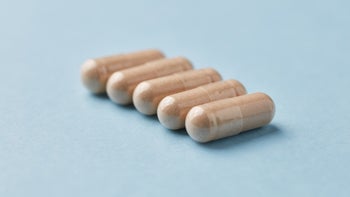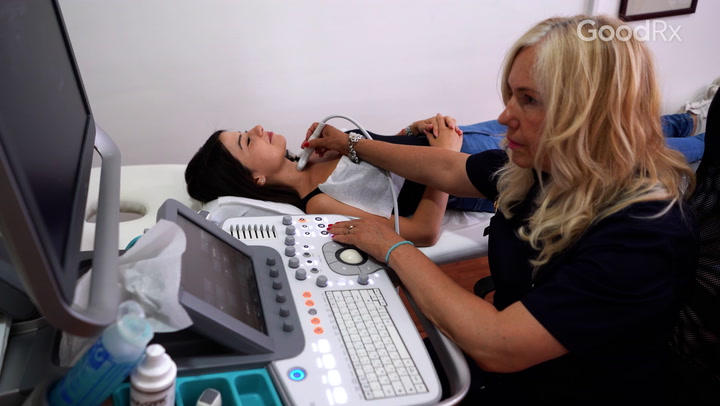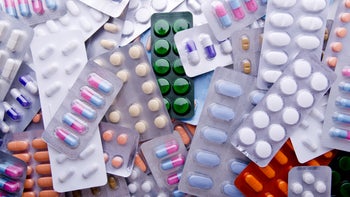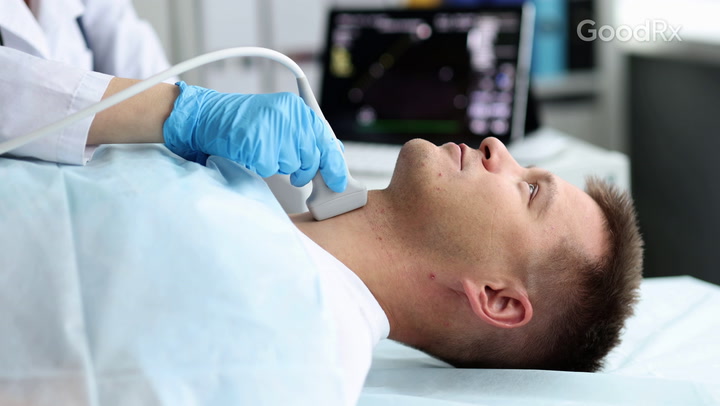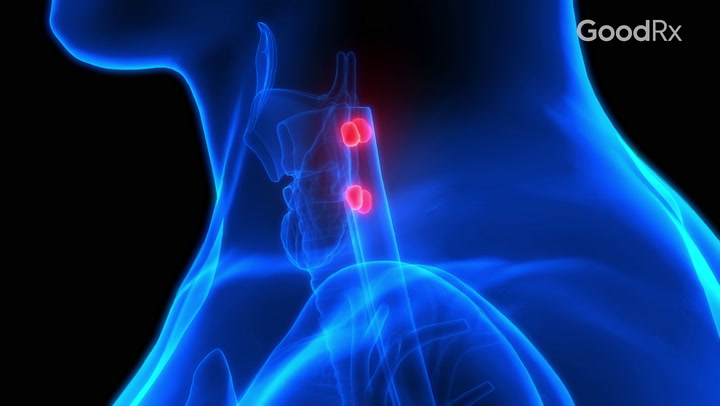
Hypothyroidism Diet: How Nutrition Affects the Thyroid, and Foods to Avoid
Key takeaways:
Some nutrient deficiencies — like iodine and selenium deficiencies — can lead to hypothyroidism. But, in the U.S., most people get enough of these nutrients in their diet.
Good foods to eat if you have hypothyroidism include fruits, vegetables, whole grains, and lean protein. These foods help prevent vitamin deficiencies, lower inflammation, and support general health.
There aren’t foods you must avoid with hypothyroidism. But some foods — like dairy products, coffee, and soy — can interfere with how your body absorbs thyroid medicine.
Table of contents

If you have hypothyroidism (an underactive thyroid), you know that key ways to feel your best include taking thyroid medication (like levothyroxine) and having regular lab work. Thyroid hormones play a key role in metabolism, the body’s process of turning food into energy. These hormones support the health of your heart, brain, muscles, and lungs. They also support your growth.
But does what you eat also affect your thyroid hormone levels? In addition to taking medication, paying attention to your diet can help you feel better, improve your long-term health, and may even improve your thyroid function. Here’s how.
What vitamins and minerals can affect the thyroid?
You may wonder about the role of specific nutrients, like vitamins and minerals. Let’s dive into what the science shows and what experts say about the role of nutrition in hypothyroidism.
Search and compare options
Iodine
Iodine helps regulate how much thyroid hormone the body makes. Iodine deficiency is one of the most common and preventable causes of hypothyroidism throughout the world. But, thanks to a good amount of iodine in our salt, it’s rare in the U.S.
Keep in mind that unnecessary supplementation or too much iodine can also lead to thyroid problems. That said, pregnant women everywhere should take iodine to make sure they get enough thyroid hormone to help the baby’s brain development. The American Thyroid Association recommends that all U.S. women who are planning for pregnancy, pregnant, or breastfeeding should supplement with 150 mcg of iodine daily.
Selenium
Selenium plays an essential role in making thyroid hormone. Selenium deficiency can lead to low thyroid levels, and it’s linked to a type of hypothyroidism called autoimmune thyroiditis (also called autoimmune hypothyroidism or Hashimoto’s disease). Taking selenium supplements can be helpful if you’re deficient. But, like iodine deficiency, selenium deficiency is rare in the U.S.
Some research shows that when people with autoimmune thyroiditis take selenium supplements, it can lower the level of some blood markers of the condition. But there’s no evidence that it changes how mild or severe the condition is, how much medicine you need, or how you feel overall. So, experts don’t recommend selenium supplementation to prevent or treat hypothyroidism.
Zinc
Some evidence links low zinc levels to low thyroid hormone levels. But the science isn’t strong enough to recommend routine zinc supplements for people with hypothyroidism. And most Americans get enough zinc through a regular diet.
Iron
The relationship between iron and the thyroid is complex. Iron deficiency makes it harder for the thyroid gland to make thyroid hormone. And low thyroid levels can lead to low iron levels by reducing iron absorption in the gut. To muddy the waters even more, some of the symptoms of low iron and hypothyroidism are the same, including hair loss, feeling cold, and fatigue.
Natural treatments for hypothyroidism: Can supplements or physical therapy help? We’ll review what the science says about alternative treatments.
Hypothyroidism and weight gain: Untreated hypothyroidism can lead to weight gain. Learn how the thyroid affects weight, and what you can do about it.
Can hypothyroidism cause anxiety or depression? Yes, and here’s what can help. Whether you choose therapy, relaxation techniques, or medication, you have options.
For people with hypothyroidism and low iron, taking iron supplements can help thyroid function. But iron supplements can make it harder for the body to absorb thyroid medication. So, iron supplements and thyroid medication shouldn’t be taken at the same time.
Vitamin D
There’s evidence that vitamin D deficiency may be linked to autoimmune hypothyroidism, but one doesn’t cause the other. The evidence isn’t clear enough to recommend vitamin D treatment for people with an underactive thyroid.
What foods should you eat or avoid with hypothyroidism?
If you eat a well-balanced diet, you’re unlikely to have nutrient deficiencies, like those mentioned above. For someone without nutritional deficiencies, there isn’t good evidence that eating or avoiding certain foods will help your thyroid function.
But some foods can still play a role in supporting thyroid health. We’ll review what the science says about foods good for low thyroid, and potential foods to avoid with hypothyroidism.
Foods to prioritize
The best foods to eat if you have hypothyroidism are those that give you a variety of nutrients and vitamins. Dr. Sonal Chaudhry, assistant professor of endocrinology, recommends aiming for a well-balanced diet that lowers inflammation and supports general health. This can help prevent heart and metabolic complications of hypothyroidism down the line. This means prioritizing:
Plenty fruits and vegetables (especially leafy green vegetables)
Legumes and nuts
Dairy foods
Eggs
Lean protein (especially fish and seafood)
Healthy fats (from olive oil and fatty fish)
Foods to limit
Wondering about which foods to avoid with hypothyroidism? “You don’t need to avoid specific foods just because you have hypothyroidism,” Chaudhry says. But the foods you eat can potentially impact your thyroid hormone levels. Here’s what you need to know.
It’s important to limit foods that are more likely to lead to chronic conditions, like diabetes and heart disease.
Foods to limit include:
Red meat
Processed meats
Added sugars
Sodium
Alcohol
Unhealthy fats (saturated and trans fats)
Can goitrogens affect your thyroid?
Goitrogens are substances that make it harder for your body to produce thyroid hormone. Eating very large amounts of these foods in raw form can make it harder for your thyroid gland to work. They’re called goitrogens because this could lead to a goiter (an enlarged thyroid).
Food goitrogens include:
Cassava
Lima beans
Linseed
Sorghum
Sweet potatoes
Cruciferous vegetables (like cabbage, kale, cauliflower, broccoli, and turnips)
Flavonoids (like soy or millet)
But goitrogens are central to a healthy diet. And you can eat several servings a day without them having any effect on your thyroid health. Also, cooking these foods makes them even less likely to have an effect on your thyroid gland.
So, don’t cut back on these essential foods. The only exception is if you have an iodine deficiency. If you have low iodine, goitrogens are more likely to interfere with thyroid function. So, you should minimize the above foods until your iodine level is normal. But, remember, iodine deficiency is highly unlikely in the U.S.
Does a gluten-free diet improve thyroid health?
Many people with hypothyroidism also have celiac disease. That’s because both autoimmune hypothyroidism and celiac disease are autoimmune conditions. So, having celiac disease increases the risk of hypothyroidism by up to four times.
But does following a gluten-free diet help if you have an underactive thyroid? In short, no. Although some research suggests that a gluten-free diet might have a small effect on thyroid function, there isn’t evidence that a gluten-free diet improves outcomes in people with an underactive thyroid.
Is being vegan bad for your thyroid?
No, being vegan isn’t necessarily bad for your thyroid. “But, if you’re vegan,” Chaudhry says, “you should make sure that you have enough iodine in your diet to support thyroid function, since seafood and dairy products contain iodine.” Consuming iodized salt is an easy way to make sure you have sufficient iodine levels, if you’re not eating seafood and dairy products in your diet.
Another thing to consider is that vegan diets are often rich in soy products. Chaudhry cautions against consuming excessive amounts of soy products. These can interfere with how your body absorbs thyroid medication (more on this below).
Can foods affect how you absorb hypothyroidism medication?
Some foods and nutrients interfere with how much thyroid hormone medication your body absorbs. This can make medication less effective. Your body may have a harder time absorbing thyroid medicine if you take it around the same time as:
Coffee
Dairy products
Calcium-containing supplements
Iron
Fiber
Soy
Aluminum supplements
Chromium supplements
Here’s a good general rule: Take thyroid medication on an empty stomach (about 30 to 60 minutes before meals) and about 4 hours apart from vitamins or supplements that contain iron, aluminum, calcium, or chromium. Otherwise, your body might not absorb enough of the thyroid medication.
Some data shows that vitamin C might help your body absorb levothyroxine. Talk to a healthcare professional about possibly taking your levothyroxine with vitamin C.
Frequently asked questions
Most people can’t reverse hypothyroidism with diet. The exception is if your hypothyroidism is caused by a nutritional deficiency, like iodine deficiency. If the deficiency is caught early and symptoms are mild, you may be able to reverse hypothyroidism by supplementing with iodine or other associated nutrients.
The research on coffee and hypothyroidism is mixed. Some studies indicate that drinking up to 4 cups of coffee per day might actually improve your thyroid function and lower your risk for mild hypothyroidism. But another study found that drinking 200 mg (about 2 cups or less) of coffee daily is linked to lower levels of certain thyroid hormones. More studies are needed to understand exactly how coffee affects thyroid hormones.
Dairy isn’t bad for hypothyroidism. But dairy products and calcium-containing products can make it harder for your body to absorb thyroid medicine. So, if you eat a lot of dairy and you take thyroid medicine, make sure to take your medicine on an empty stomach. And don’t take your thyroid medicine within 4 hours of taking any calcium-containing supplement.
The bottom line
Some nutrient deficiencies — like iodine and selenium deficiencies — are linked to hypothyroidism. But these deficiencies are rare in the U.S.
There’s no specific diet for people with hypothyroidism. But adopting a healthy, balanced diet can help prevent heart and metabolic health complications of hypothyroidism. You shouldn’t need to supplement with any minerals or vitamins if you eat a diet rich in fruits and vegetables, whole grains, legumes, nuts, and lean protein.
If you take thyroid hormone medication, make sure you take it on an empty stomach. And take it about 4 hours apart from certain supplements, like iron and calcium.
Why trust our experts?



References
Babiker, A., et al. (2020). The role of micronutrients in thyroid dysfunction. Sudanese Journal of Paediatrics.
Bashar, A., et al. (2020). Role of dietary factors in thyroid disorders: Current evidences and way forwards. Thyroid Research and Practice.
Centers for Disease Control and Prevention. (2025). Micronutrient facts.
Czarnywojtek, A., et al. (2023). The role of vitamin D in autoimmune thyroid diseases: A narrative review. Journal of Clinical Medicine.
Eastman, C. J., et al. (2018). The iodine deficiency disorders. Endotext.
Elfström, P., et al. (2008). Risk of thyroid disease in individuals with celiac disease. The Journal of Clinical Endocrinology & Metabolism.
Galanty, A., et al. (2024). Do brassica vegetables affect thyroid function? — A comprehensive systematic review. International Journal of Molecular Sciences.
Garofalo, V., et al. (2023). Relationship between iron deficiency and thyroid function: A systematic review and meta-analysis. Nutrients.
Ghiya, R., et al. (2019). SUN-591 severe iron-deficiency anemia leading to hypothyroidism. Journal of the Endocrine Society.
Khanam, S. (2018). Impact of zinc on thyroid metabolism. Journal of Diabetes, Metabolic Disorders & Control.
Larsen, C. B., et al. (2024). Selenium supplementation and placebo are equally effective in improving quality of life in patients with hypothyroidism. European Thyroid Journal.
Larsen, D., et al. (2022). Thyroid, diet, and alternative approaches. The Journal of Clinical Endocrinology & Metabolism.
Mullur, R., et al. (2014). Thyroid hormone regulation of metabolism. Physiological Reviews.
National Institute of Diabetes and Digestive and Kidney Diseases. (2021). Hashimoto's disease. National Institutes of Health.
Ng, J. M., et al. (2009). Levothyroxine and iron in pregnancy: Right dose, wrong time? Endocrine Abstracts.
Office of Dietary Supplements. (2024). Iodine: Fact sheet for consumers. National Institutes of Health.
PCRM's Nutrition Guide for Clinicians. (2020). Hypothyroidism.
Piticchio, T., et al. (2023). Effect of gluten-free diet on autoimmune thyroiditis progression in patients with no symptoms or histology of celiac disease: A meta-analysis. Frontiers in Endocrinology.
Shahid, M. A., et al. (2023). Physiology, thyroid hormone. StatPearls.
Takeuchi, T., et al. (2011). Treatment of hypothyroidism due to iodine deficiency using daily powdered kelp in patients receiving long-term total enteral nutrition. Clinical Pediatric Endocrinology.
The Public Health Committee of the American Thyroid Association. (2006). Iodine supplementation for pregnancy and lactation — United States and Canada: Recommendations of the American Thyroid Association. Thyroid.
Ventura, M., et al. (2017). Selenium and thyroid disease: From pathophysiology to treatment. International Journal of Endocrinology.
Wiesner, A., et al. (2021). Levothyroxine interactions with food and dietary supplements - A systematic review. Pharmaceuticals.
Wojtas, N., et al. (2019). Evaluation of qualitative dietary protocol (Diet4Hashi) application in dietary counseling in Hashimoto thyroiditis: Study protocol of a randomized controlled trial. International Journal of Environmental Research and Public Health.
Zhao, G., et al. (2023). Effect of coffee consumption on thyroid function: NHANES 2007-2012 and Mendelian randomization. Frontiers in Endocrinology.










